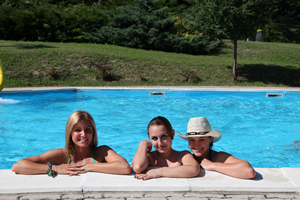The Stirone River Reserve - « Back to Tours
This park was set up in 1988 and covers 14 km of the Stirone Valley where the excavation works linked to the building of the Motorway lead to a quickening in the erosive process, bringing to light bands of rock rich in fossils which in turn have lead to the reconstruction of important phases of the Appenine Orogeny.
The Stirione river, that passes though a mainly agricultural landscape, is a left tributary of the Taro, into which it flows marking the point where the provinces of Parma and Piacenza meet. The parks’s greatest treasure are the fossils, especially of mollusks and marine gasteropods, that bear witness to climatic and environmental conditions that are vastly different from those today.
The heart of the Reserve is the “ open-air museum” located between San Nicomede and Laurano, it is home to the largest collection of fossils and marks the point where the river flows in a deep canyon sculpted in to the Pliocene clay.
The visitors centre at Scipione Ponte is the ideal departure point for a paleontological walk along the river, it is scattered with fossils that progressively reduce in age. A large number of the archeological finds discovered in the area are exhibited in the Paleontological museums in Salsomaggiore and Fidenza.
The surrounding landscape is made up of wooded hillsides and small medieval villages and towns. The steep river banks are the perfect location of the colourful bee eaters nesting tunnels.
The valleys historical patrimony includes the Vigoleno Castle, with it Roman chapel of Saint George, the Scipione fortress and the church of Saint Nicomede, where, according to tradition , there was once a stream rich in iodized salts.
The salt- rich, underground waters have always been a precious resource for this territory, since ancient times, when there was a veritable industry in salt. In the 19th century their healing properties were at the basis of the growing fame of the Terme di Salsomaggiore baths.
 |
Useful links:
Link: Official Site
Link: Pagina del progetto Parchi Accessibili
Link: Pagina della Regione Emilia-romagna
Link: Pagina della Provincia di Parma
Link: Su www.parks.it
Link: Su www.paesionline.it
Link: Su www.benessere.com
 |
The Swimming pools are an charming attraction at our campsite in Emilia Romagna... |
 |
Our campsite offers many opportunities for sports loving people that want to do exercise... |
 |
The area around the Camping Arizona campsite near Parma is full of nature and culture; you'll be... |
 |
Three food and wine routes leading through Emilia Romagna famous all over the world for its... |
 |
The thermal spa amenities and the thermal bath system in the Parma province are some of the... |
























